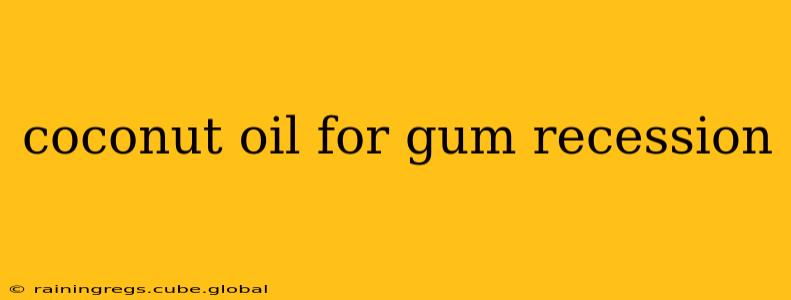Gum recession, the gradual pulling back of gums from the teeth, is a common dental problem that can lead to sensitivity, tooth decay, and even tooth loss. While professional dental care is crucial for addressing gum recession, many are exploring natural remedies like coconut oil. This article delves into the potential benefits and limitations of using coconut oil for gum recession, addressing common questions and concerns.
Does Coconut Oil Help with Gum Recession?
The short answer is: it's complicated. Coconut oil possesses antimicrobial and anti-inflammatory properties, thanks to its medium-chain triglycerides (MCTs) and lauric acid. These properties might offer some benefits in managing gingivitis (gum inflammation), a precursor to gum recession. However, coconut oil is not a cure for gum recession. It cannot reverse the process of receding gums.
Think of it this way: coconut oil might help soothe irritated gums and prevent further inflammation, but it won't magically regrow lost gum tissue. Its role is more preventative and supportive than curative.
Can Coconut Oil Prevent Gum Recession?
While coconut oil can't prevent gum recession directly, its antibacterial properties can help control the oral bacteria implicated in gingivitis. By reducing inflammation and improving oral hygiene, it might indirectly contribute to preventing further gum recession. However, relying solely on coconut oil is risky. A comprehensive approach combining proper oral hygiene, regular dental checkups, and professional treatments is far more effective.
How to Use Coconut Oil for Gum Health?
If you're considering using coconut oil for gum health, the most common method is oil pulling. This involves swishing a tablespoon of coconut oil in your mouth for 10-20 minutes before spitting it out. However, there's limited scientific evidence to support oil pulling's effectiveness against gum recession specifically.
Always remember: oil pulling should supplement, not replace, proper brushing and flossing.
Is Coconut Oil Pulling Safe?
Generally, coconut oil pulling is considered safe for most people. However, some individuals might experience minor side effects such as nausea or upset stomach, especially if they swallow the oil. Avoid oil pulling if you have any known allergies to coconut products. Furthermore, ensure you use high-quality, unrefined coconut oil.
What are the Best Practices for Gum Recession Treatment?
Treating gum recession effectively requires a multifaceted approach involving professional dental care:
- Regular Dental Checkups: Early detection is key. Regular checkups allow dentists to identify and address gum recession before it becomes severe.
- Professional Cleaning: Regular cleanings remove plaque and tartar buildup, reducing gum inflammation.
- Scaling and Root Planing: This deep cleaning procedure removes plaque and tartar from below the gum line.
- Gum Grafting: For significant gum recession, gum grafting surgery may be necessary to restore lost gum tissue.
What are the Alternatives to Coconut Oil for Gum Recession?
Several other approaches can support gum health and potentially slow down gum recession:
- Improved Oral Hygiene: Consistent brushing and flossing are paramount.
- Antibacterial Mouthwash: Mouthwashes with ingredients like chlorhexidine can help control oral bacteria. (Always follow dentist's instructions)
- Quit Smoking: Smoking significantly increases the risk of gum disease.
- Addressing Underlying Medical Conditions: Certain medical conditions can contribute to gum recession.
Conclusion:
Coconut oil might offer some ancillary benefits in supporting gum health due to its antimicrobial and anti-inflammatory properties. However, it’s crucial to understand that it's not a standalone treatment for gum recession. It should be considered a supplemental measure alongside a comprehensive oral hygiene routine and professional dental care. For effective management and treatment of gum recession, always consult a dentist. They can provide a personalized treatment plan based on your specific needs and the severity of your condition.
